LGBT
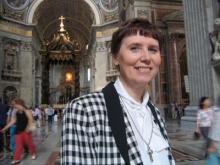
ROME — On its 15 previous pilgrimages, the Catholic gay rights group New Ways Ministry drew maybe two-dozen people to visit holy sites in places like Assisi and Rome.
This year, the number of pilgrims unexpectedly doubled to 50.
Chalk it up to the so-called Francis Effect, where the pope’s open-arms acceptance is giving new hope to gay and lesbian Catholics who have felt alienated from their church for decades.
What’s been even more surprising is that both New Ways and a similar Catholic LGBT organization in Britain are finding support from the Catholic hierarchy in their efforts to meet the pontiff when they both visit the Vatican on Ash Wednesday, the start of Lent, the period of penance and fasting preceding Easter.
For example, Archbishop Georg Ganswein, head of the papal household and the top aide to Pope Emeritus Benedict XVI, responded to New Ways’ request for a papal meet-and-greet by reserving tickets for the group at Francis’ weekly public audience in St. Peter’s Square. It’s not a private meeting — which is tough for anyone to get — but it’s not nothing.

Jordyn Garrett left home so he could become Olivia. Lerato “Lee” Mokobe left South Africa to pursue her dreams, but can’t return because of the dangers her home life and culture posed to her identity. Sarah Silva left her home because of sexual abuse and unhealthy family relationships.
They’re not even old enough to rent a car, and yet they’re living homeless in New York City. But these and other young adults found themselves a family in the Reciprocity Foundation.
The Reciprocity Foundation is a nonprofit dedicated to helping the city’s homeless youth realize their full potential by developing their passions and reconnecting with their spiritual side. Many of the youth they work with are people of color or part of the LGBT community, and many come from religious backgrounds.
“Many (of these youth) feel negatively towards religion since it has contributed to their isolation from their family and/or homelessness,” said Taz Tagore, a Reciprocity co-founder.
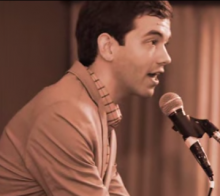
Matthew Vines took a leave of absence from his Harvard studies to explore what the Bible says about homosexuality. As a conservative evangelical Christian with a high view of scripture, Vines struggled to reconcile his identity as a gay man with the apparent teaching of the Bible. In his book God and the Gay Christian: The Biblical Case in Support of Same-Sex Relationships, Vines explains what he has learned about scripture and tells the story of his own pilgrimage of faith, fidelity, and family.
Read “My Dad’s Worst Day” (Sojourners, June 2014), an excerpt from Vine’s groundbreaking book. And be sure to watch this original SojoStory video, as Vines discusses his journey as a gay evangelical Christian who has immersed himself in seeking new and deeper understandings of what the Word has to say to us today on these profoundly important issues.
WATCH more below.

When Southern Baptists convened a national conference in Nashville, Tenn., this week to discuss issues of human sexuality, bringing conservative evangelicals and LGBT Christian activists into the same ballroom was a recipe ripe for potential fireworks.
Perhaps the most shocking thing was how few fireworks there were.
The Southern Baptist Convention’s Ethics and Religious Liberty Commission was clear: Sex is reserved between a man and a woman within the bonds in marriage. And openly gay evangelicals in attendance were equally clear: Homosexuality is not incompatible with Christianity.
No concessions were made, but leaders on both sides expressed surprise at how the two agreed to coexist. Put another way: The old emphasis on “Love the sinner, hate the sin” has become more a version of simply “Love all sinners. Ask questions later.”
“I do want to apologize to the gay and lesbian community on behalf of my community and me for not standing up against abuse and discrimination directed towards you. That was wrong and we need your forgiveness,” said North Carolina megachurch pastor J.D. Greear, drawing applause.
“We have to love our gay neighbor more than our position on sexual morality.”
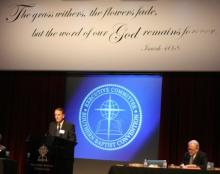
The Southern Baptist Convention’s Executive Committee voted unanimously Sept. 23 to break ties with New Heart Community Church in La Mirada, Calif., after determining it was condoning “homosexual behavior.”
“We believe that, following the lead of Pastor Danny Cortez, New Heart Community Church has walked away from the Southern Baptist Convention’s core biblical values,” said Roger Oldham, a spokesman for the committee.
Oldham said Cortez attended the meeting and indicated that he had officiated at a same-sex wedding.
The denomination has cut ties to churches that endorsed homosexuality before, but this may be the first time that its Executive Committee has withdrawn fellowship from a church on behalf of the denomination. The move came less than two weeks after the California Southern Baptist Convention’s Executive Board voted unanimously to withdraw fellowship from the congregation because of Cortez’s announcement that he affirmed gays — including his teenage son — and his church had taken a “third way” on homosexuality.
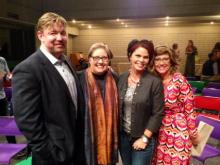
It was a gathering that would have been unthinkable just five years ago.
On a cool summer evening, in a borrowed classroom overlooking San Francisco Bay, about 150 men and women gathered to screen a short documentary about a Mormon family whose 13-year-old son came out as gay.
The Montgomerys, who accepted their son and his news, were ostracized by church members, some of whom refused to accept Communion distributed by the young man in church. Like many conservative Christian denominations, the 15 million-member Church of Jesus Christ of Latter-day Saints bans homosexual activity and considers it grounds for exclusion from Mormon rites, rituals and even the afterlife.
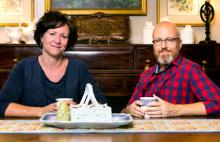
When Julie Rodgers came out as a lesbian at age 17, her mom responded by taking her to an ex-gay ministry in Dallas. Rodgers had grown up in a nondenominational evangelical church where she assumed being gay wasn’t an option.
“With ex-gay ministries, it gave me the space to be honest about my sexuality,” said Rodgers, now 28. Yet that same honesty eventually led her away from ex-gay ministries.
Rodgers spent several years in Exodus, the now-defunct ex-gay ministry, before deciding she couldn’t become straight after trying to date men. Instead, she has chosen celibacy.
When Exodus shut down in 2013, some said it spelled the end of ex-gay ministries that encourage reparative or conversion therapy for gays to become straight. Ex-gay groups such as Restored Hope Network stepped in to the gap, but many religious leaders are now encouraging those with same-sex orientation or attraction to consider a life of celibacy.
For years, those who were gay or struggled with homosexuality felt like they had few good options: leave their faith, ignore their sexuality or try to change. But as groups like Exodus have become increasingly unpopular, Rodgers is among those who embrace a different model: celibate gay Christians, who seek to be true to both their sexuality and their faith.
Straddling one of America’s deepest cultural divides, Vanessa Vitiello Urquhart wrote in a recent piece for Slate that celibate gay Christians present a challenge to the tolerance of both their churches and the secular LGBT community. Those celibate gay Christians often find themselves trying to translate one side for the other.
But frequently, neither side really understands what it’s hearing.

Following the release of the popular God and the Gay Christian by Matthew Vines, and the innumerable responses by conservative pundits and theologians — including the cleverly titled e-book “God and the Gay Christian?” (Note the question mark. It’s very important.) — the church is discussing the morality of same-sex behavior as it never has before.
That’s really not saying that much, since the idea of homosexuality being anything other than a sin hadn’t been discussed within mainstream Christianity at all before this decade or so.
But still. The dialogue is cool to see. It’s much-needed, and has been for a very long time. I want to call the conversation “long overdue,” but that would be an absurd understatement, like saying a baby in the 403rd trimester is “a little late.”

The Utah attorney general announced Wednesday that he will go straight to the U.S. Supreme Court to challenge an appellate ruling that declared the state’s ban on same-sex marriage unconstitutional.
Attorney General Sean Reyes decided to leapfrog the full 10th U.S. Circuit Court of Appeals in Denver after a three-judge panel last month upheld a lower-court ruling and declared that the U.S. Constitution’s guarantees of equal protection and due process extend to gay men and lesbians who want to marry. It was the first time a federal appeals court had ruled on the issue.
Besides Utah, the June 25 decision applies to Colorado, Kansas, New Mexico, Oklahoma, and Wyoming, but the circuit court put its ruling on hold, pending appeals.

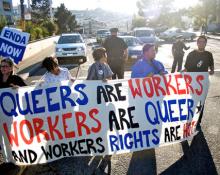
What’s the next religious liberties faceoff? Some suggest it could be between LGBT workers and religious owners of private businesses.
On Monday, while news media dissected the Supreme Court’s Hobby Lobby ruling, President Obama pledged to sign an order protecting federal employees from discrimination based on gender identity .
But he has yet to sign an executive order version of the Employment Non-Discrimination Act, which would ban discrimination based on gender identity for all federal contractors and subcontractors, an order that affects for-profit businesses.
Now, in the wake of the Hobby Lobby ruling, such an order could rile the waters again, several legal experts say. They see a line between a ruling about contraception and hiring, firing, and benefit concerns for lesbian, gay, bisexual, and transgender employees.

Nine days after my Dad’s memorial service on June 7, I am still in Detroit.
I am still in Detroit to volunteer as a member of the More Light Presbyterians communications team at the 221st General Assembly of the Presbyterian Church (USA).
I am still in Detroit because, for the better part of three decades, my father was an active member of the progressive movements within PCUSA for affirmation and inclusion, for peace with justice.
I am still in Detroit because my dear friends who got married on my former land in rural Tennessee could not have their vows acknowledged by church or state because they are both men.

Taking aim at the Boy Scouts of America’s continuing ban on gay adult leaders, Attorney General Eric Holder said the prohibition perpetuates “the worst kind of stereotypes.”
Referring to the group’s work a decade ago to challenge the termination of a gay assistant scoutmaster, Holder said that “too many organizations, policies, and practices that discriminate against LGBT individuals remain persistent concerns.”
“Unfortunately, the continuation of a policy that discriminates against gay adult leaders — by an iconic American institution — only preserves and perpetuates the worst kind of stereotypes,” he said.
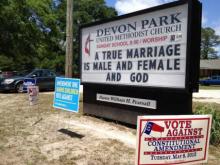
Will the United Methodist Church soon have to drop the “United” part of its name?
A group of 80 pastors is suggesting that the nation’s second-largest Protestant denomination is facing an imminent split because of an inability to resolve long-standing theological disputes about sexuality and church doctrine.
But more than lamenting the current divisions, the pastors indicated there is little reason to think reconciliation — or even peaceful coexistence — could be found. Like a couple heading to divorce court, the pastors cited “irreconcilable differences” that can’t be mended.
“We can no longer talk about schism as something that might happen in the future. Schism has already taken place in our connection,” said the Rev. Maxie Dunnam, a retired president of evangelical Asbury Theological Seminary in Kentucky, who joined the statement.
Matthew Vines sits down with Sojourners to discuss his first book, "God and the Gay Christian: The Biblical Case in Support of Same-Sex Relationships."
OURS IS A CHRISTIAN FAMILY STORY. It is also a loving, loyal, confused church story. There’s nothing all that unusual about it, really. But precisely because similar stories are unfolding in countless families and churches today, I want to share it.
I want you to see how sexual orientation and deeply held beliefs are at odds in ways that injure those we love. This debate is not simply about beliefs and rights; it’s about people who are created in God’s image. Those people may be like you or entirely unlike you. They may be your roommate or neighbor, your best friend or a colleague. They may be your son or daughter.
My dad would later tell me the day I came out to him was the worst day of his life. His sister had passed away the year before; his father years earlier. But the day I said “Dad, I’m gay” was the worst day of his life. To his credit, though, he didn’t tell me that at the time. He hugged me and listened as I nervously stumbled over my words for an hour and a half. Then he told me he loved me.
My mom, too, responded with open arms, but the news was hard for her to hear. She could barely eat for several days afterward, and she spent much of the next year deeply dispirited. Still, I was grateful for my parents’ unfailing compassion and love.
What that love would ultimately look like, though, was unclear.

These are important conversations we are having. Where do we invest our money responsibly in organizations who do the work of justice? How do we interpret Scripture regarding sexuality and marriage, and how does that intersect with church and parachurch employment practices? In what ways can we truly love our neighbors — gay, straight, rich, poor, Christian, Atheist? These are questions that matter to real life people in our world, and we must talk about it.
But we are talking too fast.
What is troubling about the events of the World Vision Reversal last week is not just the divisive and contentious nature of the voices coming from different sides of deeply entrenched ideological lines, but the speed with which it happened. So much of the hurt came not from the impact of actual punches, but from the whiplash of sudden, rapid reactions.

It has been a tough go for the church in the United States over the past couple months. The name calling, division, and posturing reached a deafening volume last week in the wake of the World Vision controversy around employing those in gay marriage.
Noise.
Massive amounts of energy poured into proving our “rightness” and your “wrongness.”
Relationships severed. Most without ever having created the space to share a meal and simply listen to one another.
Social media. Interviews. Articles. Press releases.
Noise.
There have been so many chiming in on this thing that I saw no need to jump in and, well, to be honest, I’ve just been sad. Sad at the failed state of discourse within the church. Sad at the demonization. Sad that hungry kids across the world were losing their access to basic needs to live as a result of our inability to live, love and lead … together.

“When we were children, we used to think that when we were grown-up we would no longer be vulnerable. But to grow up is to accept vulnerability … To be alive is to be vulnerable.”
These are the words of Madeleine L’Engle, and this week I’ve been reminded of the wisdom they contain.
This weekend, Christianity Today posted an excerpt from my new book, Jesus is Better Than You Imagined, in which I share a story about childhood sexual abuse and my adult struggle to understand my sexuality. Many have asked why I would do such a thing.
This wasn’t a career move or a brazen attempt to sell more books. Being open about these experiences as an evangelical writer leaves me, like so many scarecrows, exposed. I do not plan to become a spokesman for any of the issues addressed in this article. The events shared are a part of my story, but they are not the whole of my calling. Today, I return to my job as a columnist committed to exploring the interface between faith and culture and helping foster difficult conversations that others may be unwilling to have.